The gay men at the center of two new European films turn their gazes within, and their soul searching sends them headlong into the past. The nature of their romantic relationships is fierce and ephemeral in one case, youthful and furtive in the other.
Their settings: London and rural France. Their demeanor: wistful and bittersweet. These literary adaptations grapple with the lingering effects of past events while also looking at the here and now, with one of them giving a same-sex spin to a (resolutely hetero) Japanese novel from the 1980s. One gained traction during awards season, only to wake up empty-handed on the morning the Academy Award nominations were announced. (It's nevertheless better than many of this year's Best Picture nominees.) It also bears mentioning that neither film shies away from depicting male intimacy in frank, unblinking terms.
To quote a Frankie Goes to Hollywood ballad that figures prominently in one of these films, they purge the soul and make love their goal. Let's dive in.
“All of Us Strangers”: They sit across from each other at the dinner table, a happy couple in their 30s and a polite man in his 40s, appearing to catch up after a long time apart. Polite, because he can't quite believe what is taking place. They're inside his old childhood home on the outskirts of London, the three of them, but the trio in “All of Us Strangers” are not at all strangers.

Andrew Scott as Adam in a scene from "All of Us Strangers." (Photo courtesy of Searchlight Pictures).
Adam (Andrew Scott) is not laughing along with cousins, younger siblings or old college buddies. Because the couple beaming at him from across the table are his mom (Claire Foy) and dad (Jamie Bell), looking exactly the way they did on the night they were killed.
The scene is jovial, lighthearted. Then it hits you like a wrecking ball, going for the tear ducts with the efficacy of a heat-seeking missile.
The encounter comes pretty early on in Andrew Haigh's ghost story, adapted from Taichi Yamada's 1987 novel, and it sets the tone for this potent meditation on loss, grief and loneliness, imbuing what could have been a dark and somber foray into a man's inner turmoil with warmth and a curiosity about how different generations view the world around them.

Paul Mescal as Harry and Andrew Scott as Adam in a scene from "All of Us Strangers." (Photo courtesy of Searchlight Pictures).
But while the film's hook is essentially the same as in Yamada's taut, gripping book, what comes after sends Haigh in a different, more ambiguous direction, informed by the filmmaker's own queerness, that takes Adam on a journey of self-discovery. Along the way, he encounters an actual stranger, a younger man called Harry (Paul Mescal). Harry, who lives in the same sparsely populated London high-rise as Adam, comes knocking on Adam's door one night, flirtatious and more than a little drunk on Japanese whisky. Adam, once again polite but reticent, literally finds himself unwilling to let him in.
At first. Reuniting with his dead parents bolsters the protagonist's resolve and confidence. So Adam, a screenwriter not that far removed from the divorced TV writer in Yamada's novel, tentatively finds his way back to Harry, separated not just by several floors but by a generational chasm in their attitudes about their sexual orientation. A series of conversations follow, both between Adam and Harry and Adam and his parents, in which the protagonist deconstructs his upbringing and delves into the set of circumstances that have led him to this moment in time: middle-aged and alone, yet as he (not so convincingly) stresses, not lonely.
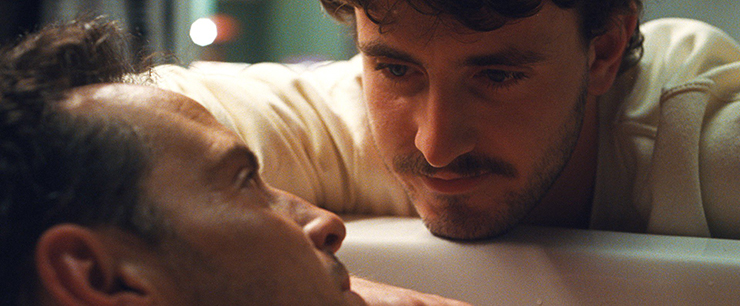
Andrew Scott as Adam and Paul Mescal as Harry in a scene from "All of Us Strangers." (Photo courtesy of Searchlight Pictures).
A closed door opens just a peek, then gradually all the way, as Adam and Harry get to know each other, and soon after, each other's bodies. Haigh stages their lovemaking with lived-in immediacy. This isn't raw, animalistic sex, but sex as a hand extended in the dead of night from one distant nomad to another.
The film's tenderness is forged by a mixture of conflicting emotions, such as what you may feel toward the people who raised you: gratitude multiplied by the passage of time and lingering resentments that go unspoken. Haigh and his exceptional cast explore these spiritual nooks and crannies with patience and a profound melancholy.
But as “All of Us Strangers” goes deeper into Adam's headspace, the line between reality and illusion blurs further, bringing to mind the disorienting allure of David Lynch's “Mulholland Drive” and Adrian Lyne's “Jacob's Ladder.” Holding together these physical and mental landscapes that bleed into one another is the way Haigh distills the elements of a spooky tale through his lyrical, character-driven sensibility. The “Weekend” and “45 Years” director, who turned 51 earlier this week, is invaluably aided by cinematographer Jamie Ramsay's use of space to convey Adam's isolation and editor Jonathan Alberts' languid dissolves, which convey Adam's attempt to snatch strands of memory that are not always within reach.
So why did Haigh excise the more visceral genre elements that Yamada, who died last year at age 89, inserted into his novel, which at times reads like a J-horror movie on the page ... and where (I've been waiting months to write these words) Paul Mescal is a woman? The director opts for a less straightforward, more elliptical approach, but I can't help thinking the film would have benefited from the disquieting jolt (and debilitating effects) of Yamada's apparitions.
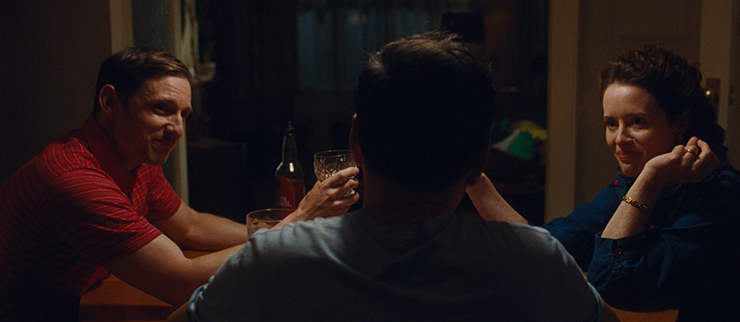
Jamie Bell as Dad and Claire Foy as Mum in a scene from "All of Us Strangers." (Photo courtesy of Searchlight Pictures).
Haigh does choose to retain the book's eleventh-hour revelation, which has become a sticking point for some who take issue with the film's ending and its connotation for gay relationships. Part of the reason I'm glad to have procrastinated in reviewing this film is that it gave me time to let it digest. (You will definitely want to see it more than once.) I now see the resolution as a key to understanding Haigh's philosophical rumination on queer identity: what shapes it, how it can be a blessing but also a ghostly curse. More importantly, how it can trap you in a prison of your own making, and how it can set you free.
“Healing” has become such an overused word, but that is Haigh's endgame. With “All of Us Strangers,” one of 2023's best films, he's made a fever dream and a bear hug rolled into one lush, open-hearted package, a brilliantly crafted and performed wish-fulfillment safe space occupied by the words gay men of a certain generation long to have said before it was too late.
“Lie with Me”: Next to Haigh's atmospheric, richly layered achievement, a modest prestige French movie about an author revisiting his past and remembering his first love feels basic and quaint, but there's a depth of feeling and a refusal to shy away from tough questions that make this handsomely mounted production worth seeking out.
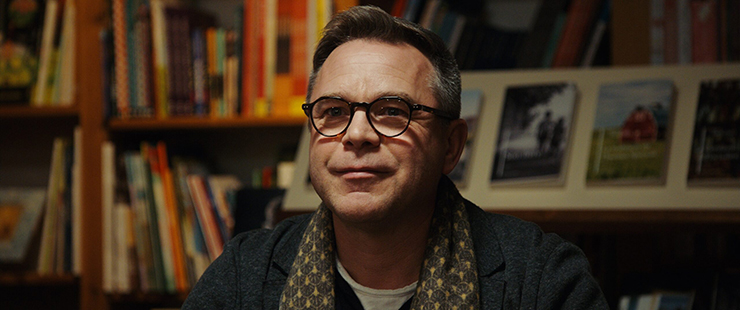
Guillaume de Tonquedec as Stephane Belcourt in a scene from "Lie with Me." (Photo courtesy of Cinephobia Releasing).
The film, adapted from Philippe Besson's 2017 novel (itself translated into English by none other than Molly Ringwald), centers around acclaimed writer Stéphane Belcourt (Guillaume de Tonquédec) and is structured around the fiftysomething Parisian scribe's return to his hometown in southwestern France in the late 2010s. What brings him back home after a 35-year absence is ostensibly a brand ambassadorship for the region's most renowned export: the cognac. But his return triggers an onslaught of memories.
They come flooding back in the form of flashbacks, as 17-year-old Stéphane (Jérémy Gillet), a shy, straw-haired loner hiding behind dorky glasses, pines for his strapping classmate Thomas Andrieu (Julien De Saint Jean), circa 1984. Thomas is the stoic and silent type, with a guarded look that says “back off.” Naturally, he rides a motorcycle. Stéphane knows he's forever out of reach. Or is he? Thomas hands Stéphane a piece of paper and tells him to meet after school.
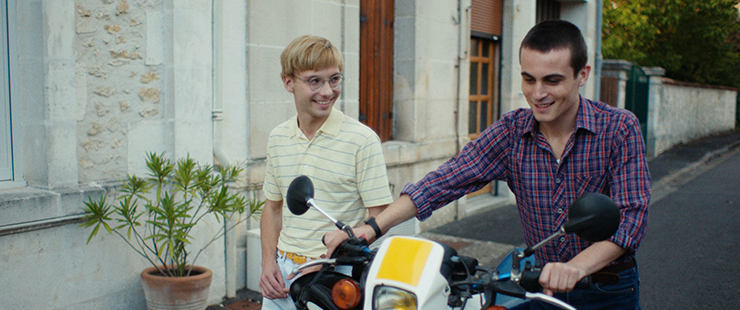
Jeremy Gillet as 17-year-old Stephane Belcourt ans Julien de Saint Jean in a scene from "Lie with Me." (Photo courtesy of Cinephobia Releasing).
Director and screenwriter Olivier Peyon eschews the sentimentality of what could have been portrayed as puppy love. Instead, he depicts Stéphane rough deflowering with clear-eyed naturalism. Thomas insists he also like girls and requires Stéphane to keep their hookups to himself. Of course, the budding writer is smitten.
Back in the present day, older Stéphane feels as if he has seen a ghost when he spots a young man who's the spitting image of his former lover. Lucas (Victor Belmondo, the grandson of “Breathless” star Jean-Paul Belmondo), he soon learns, is the son of Thomas, who has also come back home and is essentially playing tour guide to a group of Americans drawn to the region by its liquor.
Stéphane withholds the details about his, um, friendship with Thomas, but the autobiographical fiction that put him on the map, predominantly inspired by his boyhood affair, tells on him. It also becomes clear that Lucas knows more than he lets on and has his own agenda. From this point on, “Lie with Me,” or its much more interesting French title, “Arrête avec tes mensonges” (translated to “Stop with the Lies”), follows a familiar and shopworn path of disclosures and recriminations that involves some very French bickering and a climactic speech that ties everything up in an all-too-neat bow but is nevertheless delivered with disarming conviction.
Thomas' self-loathing and internalized homophobia, bearing more than a passing resemblance to Ennis Del Mar's in “Brokeback Mountain,” is never less than absorbing. How the film examines the role that Stéphane's adolescence had on his craft has echoes of Pedro Almodóvar's “Bad Education.”
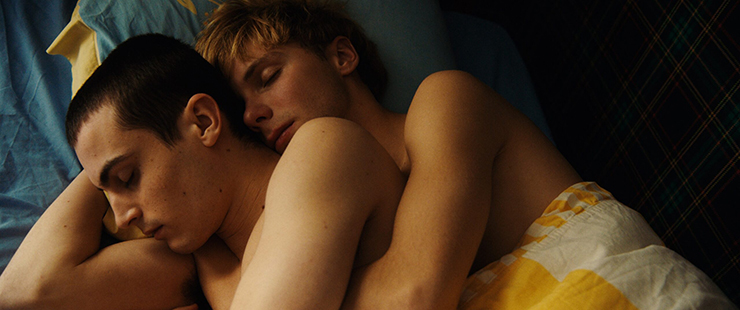
Julien de Saint Jean as Thomas and Jeremy Gillet as 17-year-old Stephane Belcourt in a scene from "Lie with Me." (Photo courtesy of Cinephobia Releasing).
What prevents “Lie with Me” from reaching the heights of either of those two films is the mechanical nature of how it reveals its secrets, how it etches the events in Thomas' adult life in broad strokes and reduces a traumatic event to a dramatic reveal used to move the narrative along. Peyon has made an engaging travelogue that orbits around an unfortunate cliché.
And yet, the actors keep you invested. Peyon takes you inside young Stéphane's bedroom, with its full bookshelves and plaid wallpaper, where he sneaks in Thomas and where the boys have a heart-to-heart about their hopes, dreams and fears. It's a tricky tightrope that Gillet and De Saint Jean are required to walk, but the stars are able to sell how their characters' affair, initially driven by lust, deepens into a more affectionate and mutually supportive bond.
The increasingly fraught interactions between older Stéphane and Lucas bear the brunt of the film's contrivances, but Belmondo, who has his grandfather's lips, and de Tonquédec, who looks like a cross between John Michael Higgins and Rex Reed, prevail over their story's creaky twists and turns. They make you believe it's possible to make peace with your past, even if getting there occasionally feels like a wallow in arthouse nostalgia.
“All of Us Strangers,” which recently picked up Best Picture honors at this year's Dorian Awards, is now streaming on Hulu. “Lie with Me,” which took Best Narrative Feature honors at last spring's OUTshine Film Festival, is now available for digital rental via Apple TV, Amazon Prime Video, Google Play and Vudu. It has also been released on DVD.




